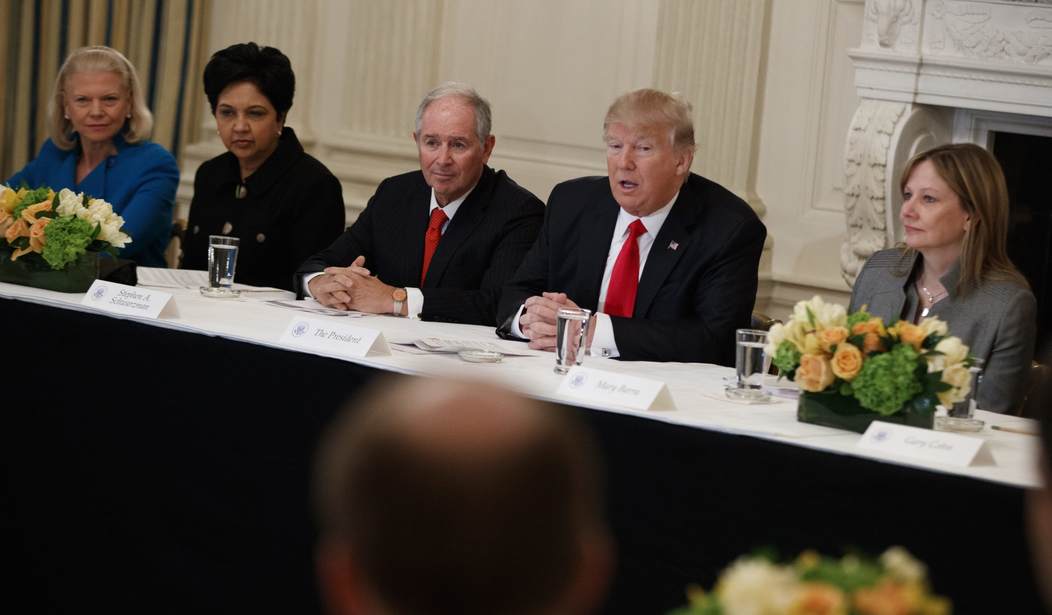WASHINGTON — President Trump said today that he wants to cut “a lot out of Dodd-Frank,” the Wall Street Reform and Consumer Protection Act passed in 2010 after the recession, “because frankly, I have so many people, friends of mine that had nice businesses — they can’t borrow money.”
“They just can’t get any money because the banks just won’t let them borrow it because of the rules and regulations in Dodd-Frank,” Trump said at a morning White House forum with CEOs.
Companies represented at what the administration called a strategy session included General Motors, Walmart, Cleveland Clinic, JP Morgan Chase, Boeing, Tesla, Pepsi, IBM, Ernst & Young and General Electric.
Trump issued a presidential memorandum to the Labor Department today ordering review of the Conflict of Interest Rule ‑‑ Retirement Investment Advice, declaring the April 2016 rule “may significantly alter the manner in which Americans can receive financial advice, and may not be consistent with the policies of my administration.”
A fact sheet on the rule has been deleted from the Labor Department’s website within the past few days.
“Changes in the retirement landscape over the last 40 years have increased the importance of sound investment advice for workers, their families and plan fiduciaries. While many advisers do act in their customers’ best interest, not everyone is legally obligated to do so and some do not. Many investment professionals, consultants, brokers, insurance agents and other advisers operate within compensation structures that are misaligned with their customers’ interests and often create strong incentives to steer customers into particular investment products,” stated the Labor summary on the fiduciary rule.
“These conflicts of interest do not always have to be disclosed and advisers have limited liability under federal pension law for any harms resulting from the advice they provide to plan sponsors and retirement investors. These harms include the loss of billions of dollars a year for retirement investors in the form of eroded plan and IRA investment results, often after rollovers out of ERISA-protected plans and into IRAs.”
Trump’s memo tells the Labor Department that “if you conclude for any other reason after appropriate review that the Fiduciary Duty Rule is inconsistent with the priority identified earlier in this memorandum ‑‑ then you shall publish for notice and comment a proposed rule rescinding or revising the Rule, as appropriate and as consistent with law.”
The review is supposed to “determine whether it may adversely affect the ability of Americans to gain access to retirement information and financial advice.”
Trump also signed an executive order outlining “core principles” in regulating the U.S. financial system, including preventing government bailouts and having a goal to “rationalize the Federal financial regulatory framework.”
The Treasury secretary has to report to Trump in 120 days on “the extent to which existing laws, treaties, regulations, guidance, reporting and recordkeeping requirements, and other Government policies promote the Core Principles and what actions have been taken, and are currently being taken, to promote and support the Core Principles.”
The order didn’t mention Dodd-Frank by name, but White House press secretary Sean Spicer labeled it “a disastrous policy that’s hindering our markets, reducing the availability of credit and crippling our economy’s ability to grow and create jobs.”
Spicer told reporters at today’s briefing that “there’s the administrative piece, which he’s starting to address through executive actions, and then there’s a legislative piece that I think we’re gonna work with Congress on.”
“And I think that there’s no question that the president talked about this extensively, the impact that it’s had. And — and it’s not — it’s not an either/or. It’s, frankly, just not doing what it set out to do,” he added. “And so I think we’re going to continue not just to act through administration — administrative action, but through working with Congress in figuring out a legislative fix.”









Join the conversation as a VIP Member